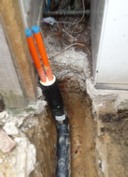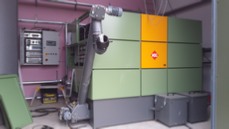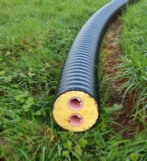

Web design © Graeme de Lande Long. Terms & Conditions.



Community Website
Scaynes Hill Village



District Heating at KPS
Scaynes Hill village is at the centre of the green energy revolution! KPS, the composting, landscape gardening and tree surgery business at the end of Ham Lane, is in the process of installing a new heating system for all their buildings. A new barn has been built, and this will house a large boiler which will use wood chips as fuel.
03 Dec 2015 Posted by Mike Lavelle
The heat generated will be conveyed to individual buildings via underground insulated pipes carrying hot water (see photo on the left). The system is known as "district heating", and is increasingly common in this country, but has been used in Germany for several years now, sometimes to heat whole villages. Paul Smyth, the owner of KPS, says, " At the moment, we generate huge amounts of wood chip, as a by-product of our tree-surgery business. Some of this is turned into compost, and the excess is sold to power-stations as fuel. It makes ecological and economic sense for us to use this material to heat all of our buildings. The capital cost of the project is in the order of £250,000, but with government grants this amount will eventually be paid off, and then we will be using our own fuel which we have on-site anyway".
The project has involved digging an 80cm deep trench to every building, to house the insulated piping. This has been quite disruptive, but the work is now nearly finished. One boiler will serve 4 houses, 1 office building, 10 industrial units and various workshops. The hot water travels along the pipe to an individual house, and the heat is transferred to the house's own heating system via a heat exchanger which is located next to the existing house boiler. This means that the existing oil-fired system can remain in place as a backup. When the house's heating system is switched on, a valve is opened which allows the hot water to flow, and when the system is switched off, the pressure in the pipe builds up, which in turn causes a pump near the central boiler to turn off. This pump is activated or de-activated by the pressure differential across it, so that the individual house is not being supplied with hot water when it is not needed, but there is no electrical connection between an individual house and the central boiler.
These systems are being installed in many different locations in England at the moment, and the same company has installed a similar system at Glyndebourne Opera House.
KPS has been at the forefront of renewable energy initiatives in Scaynes Hill. Earlier this year they installed 30kW of solar panels on one of their industrial units, which have been supplying energy for the units with any excess being fed back into the grid.
To find out more about KPS and what they do visit their website at http://www.kps.uk.com/


